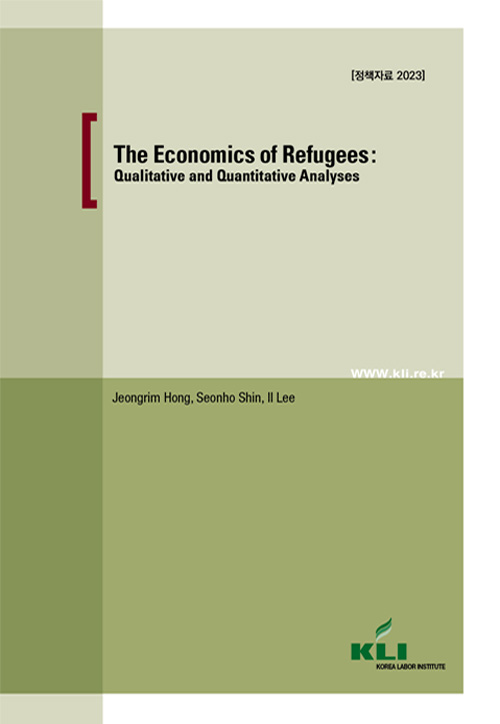한국노동연구원 'Publications in English'에 대한 설명 입니다.
Publications in English
Publications in English

The Economics of Refugees : Qualitative and Quantitative Analyses
- Author Jeongrim Hong et al.
- Publication Date 2023.12.29
- Length 108
- ISBN 979-11-260-0669-1
Content
Chapter 1 Introduction
Chapter 2 Status, Rights, and Living Conditions of Refugees and Special Contributors in South Korea
Chapter 3 Quasi-Experimental Evidence on How Natives Respond to Sudden Asylum Seeker Influx
Chapter 4 Non-technical summaries & Conclusion
Summary
This report is composed of two main parts. In Chapter 2, policy and legal setups are analyzed in the context of South Korea. In South Korea, recognized refugees, resettlement-desiring refugees, and special contributors legally enjoy freedom in employment and entrepreneurship. However, this alone does not ensure stable employment or business success, given the inherent vulnerability of refugees. This article highlights key areas for improvement in refugee integration policies. Firstly, the state should play an active role in guiding refugees toward suitable employment opportunities that align with their skills and aptitudes. Meaningful employment not only ensures livelihood but also fosters a sense of belonging, self-esteem, and language learning through social interactions. Secondly, establishing a qualification recognition system is crucial. Creating a legal framework for a general qualification recognition committee or specific provisions in major qualification laws would facilitate refugees’ access to professions and contribute to their economic stability. Thirdly, a comprehensive language education system should be developed alongside employment protection. This is especially vital for marginalized groups, such as women in non-working households, who face difficulties accessing language education. A uniform and accessible language education system will enhance social integration and self-esteem, enabling refugees to pursue fulfilling careers. Lastly, differential treatment based on refugees’ residence status should be eliminated. Regardless of their status, all refugees are expected to reside in South Korea for an extended period. Treating them as equal members of society, free from restrictions, will promote their successful integration into Korean society. In conclusion, these policy improvements aim to enhance the prospects of refugees in South Korea, providing them with opportunities for stable employment, professional recognition, language proficiency, and equal treatment as they build new lives in their host country.
In Chapter 3, empirical analyses are made in the context of South Korea. How native residents, in response to asylum seekers’ inflows, change their attitudes and perceptions towards non-natives, has recently become a topic of intense research. However, the overwhelming majority of previous studies have focused on Western countries. To address this geographic imbalance in empirical evidence, the present study investigates the issue within the context of South Korea, which has not traditionally been a destination for forcibly displaced individuals (excluding North Korean defectors). To provide causal evidence, this paper exploits the sudden, substantial influx of Yemeni asylum seekers to Jeju Island in South Korea in 2018, which only impacted the island ‘locally’—due to its unique visa-exemption policy and the government’s immediate restrictions on the asylum seekers’ post-arrival cross-region movement off the island. Furthermore, the geographic feature of the island (the shortest ferry route to the nearest on-land port being 109 km) eliminates any non-compliance issues. These circumstances enable the estimation through the difference-in-differences (DD) method. The results from applying the DD method to South Korea’s National Multicultural Acceptability Survey, a unique population-based region-resident-level dataset, suggest that the abrupt influx of asylum seekers decreased the level of multicultural acceptance among host residents and negatively affected their attitudes and perceptions towards non-natives. Notably, strong heterogeneity seems to exist, depending on a host’s economic (e.g., education, income, employment status) and non-economic (e.g., age, marital status, overseas travel experience) factors. Especially, multicultural education, although its causality is not within the scope of this research, is found to play a strong mitigating role in native residents’ negative attitudinal responses. Longer-period estimation hints at the potential possibility that the event can have long-lasting and intensifying impacts over time. In summary, this report is not merely an exploration of challenges and opportunities but a compelling call to action. It underscores the imperative for comprehensive policy improvements in the realm of refugee integration in South Korea and provides invaluable insights into the ever-evolving attitudes of native residents towards non-natives—especially within the context of asylum seekers. These findings serve as a beacon to illuminate the path ahead for policymakers and stakeholders alike, offering a blueprint for the crafting of effective strategies that foster a more inclusive, harmonious, and equitable society in South Korea. As the country continues to navigate its role in providing refuge to displaced individuals, the recommendations and empirical evidence presented here stand as a sturdy foundation upon which to construct a more welcoming, integrated, and vibrant future for all residents, regardless of their background or circumstances.
 Source Indication + Commercial Use Prohibition + Change Prohibition
Source Indication + Commercial Use Prohibition + Change Prohibition